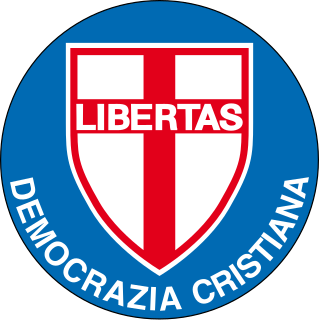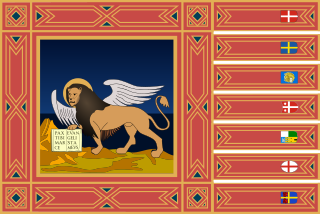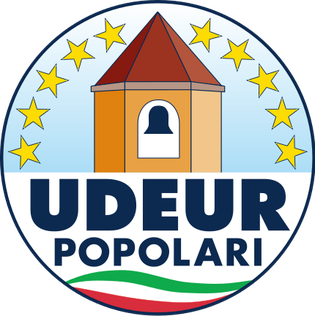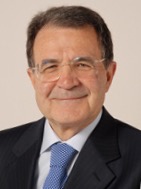The Campania regional election of 1990 took place on 6 May 1990.
Christian Democracy was by far the largest party, gaining more than double of the share of vote of its main competitors, the Italian Communist Party, which had its worst result ever in a regional election, and the Italian Socialist Party, that obtained its best result ever.

Christian Democracy was a Christian democratic political party in Italy.

The Italian Communist Party was a communist political party in Italy.

The Italian Socialist Party was a socialist and later social-democratic political party in Italy. Founded in Genoa in 1892, the PSI dominated the Italian left until after World War II, when it was eclipsed in status by the Italian Communist Party. The Socialists came to special prominence in the 1980s, when their leader Bettino Craxi, who had severed the residual ties with the Soviet Union and re-branded the party as liberal-socialist, served as Prime Minister (1983–1987). The PSI was disbanded in 1994 as a result of the Tangentopoli scandals. Prior to World War I, future dictator Benito Mussolini was a member of the PSI.
After the election Ferdinando Clemente, the incumbent Christian Democratic President, formed a new centre-left government. In 1993 Clemente was replaced by fellow Christian Democrat Giovanni Grasso.

Giovanni Grasso was an Italian stage and film actor. He appeared in 82 films between 1910 and 1955. He was born and died in Catania, Sicily, Italy.
This page is based on this
Wikipedia article Text is available under the
CC BY-SA 4.0 license; additional terms may apply.
Images, videos and audio are available under their respective licenses.

The Union was an heterogenous centre-left political and electoral alliance of political parties in Italy. The Union was the direct heir of The Olive Tree coalition which represented the centre-left in the 1996 and 2001 general elections. However, The Union also included parties of the radical left, which were not affiliated with The Olive Tree. The Union was led by Romano Prodi, Prime Minister of Italy from April 2006 to April 2008, and former President of the European Commission. Collapsing in the wake of the 2008 Italian political crisis, the alliance was succeeded by the current-day centre-left coalition.

The Sardinian Action Party is a regionalist and separatist political party in Sardinia. While being traditionally part of the Sardinian centre-left, this nationalist party has recently sided with the centre-right coalition and, more specifically, with the Lega Nord.

The Christian Democratic Centre was a Christian democratic political party in Italy from 1994 to 2002. The CCD was a member of the European People's Party (EPP).

Lega Nord Toscana is a regionalist political party in Tuscany, Italy. Founded in 1987, it has functioned as the "national" section of Lega Nord in the region since 1991.

The United Christian Democrats was a minor Christian democratic political party in Italy. The CDU was a member of the European People's Party from 1995 until 2002.

General elections were held in Italy on 14 June 1987, to select the Tenth Republican Parliament. This election marked the final inversion of the trend of the entire republican history of Italy: for the first time, the distance between the Christian Democrats and the Communists grew significantly instead of decreasing, and this fact was seen as the result of the deindustrialization of the country. The growth of the service sector of the economy, and the leadership of former PM Bettino Craxi, gave instead a new strength to the Socialists. A remarkable novelty was the rise of the new Green Lists, while a new party obtained its first two parliamentary seats: the Northern League.

The Democratic Union for the Republic was a short-lived Christian-democratic and centrist political party in Italy.

The Politics of Veneto, a Region of Italy takes place in a framework of a semi-presidential representative democracy, whereby the President is the head of government, and of a pluriform multi-party system. Executive power is exercised by the Regional Government. Legislative power is vested in both the government and the Regional Council.

This page gathers the results of elections in Veneto.

The Venetian regional election of 1995 took place on 23 April 1995.

The Apulian regional election of 2005 took place on 3–4 April 2005.

The Campania regional election of 1985 took place on 12 May 1985.

The Apulian regional election of 1990 took place on 6 May 1990.

The Basilicata regional election of 1990 took place on 6 May 1990.

The Sicilian regional election of 1947 took place on 20 April 1947. They were the first-ever election of the Sicilian Parliament.

The Union of Democrats for Europe, also known as UDEUR Populars, is a minor centrist and Christian-democratic political party in Italy.

The Italian regional elections of 1985 were held on May 12. The fifteen ordinary regions, created in 1970, elected their fourth assemblies.

The Italian regional elections of 1990 were held on May 16. The fifteen ordinary regions, created in 1970, elected their fifth assemblies.
The centre-left coalition is a political alliance of political parties in Italy active, under several forms and names, since 1995 when The Olive Tree was formed under the leadership of Romano Prodi. The centre-left coalition ruled the country for more than twelve years between 1996 and 2018.

The 2005 Italian centre-left primary election determined the leader of the coalition The Union, who will stand as common candidate for the office of Prime Minister in the subsequent general election, which will take place on 9–10 April 2006. It was won with 74% of the votes by Romano Prodi.






















